Content Writing vs Copy Writing: What’s the Difference?
Content writing vs copywriting. It’s a debate that often confuses marketers. However, don’t underestimate knowing…
TL;DR – AI Content: Is This The End Of Human-Written Content?
AI tools like ChatGPT are changing how content is created, offering fast idea generation, keyword researchKeyword research helps websites unearth the best keywords to drive traffic and visibility. This research is supported by a number of powerful web-based tools, the best of which we’ve listed here., and first-draft support – but still need human editing to ensure quality and accuracy.
Google is not against AI-generated content, as long as it is helpful, user-focused, and not produced solely to manipulate rankings – aligning with its E-E-A-T and Helpful Content guidelines.
AI is becoming more embedded in search, with tools like Google Bard and ChatGPT-integrated Bing enhancing user experience, not replacing traditional search or well-crafted website content.
AI presents ethical and quality concerns, especially around plagiarism, outdated data, and misuse – making human oversight essential for trustworthy content.
Human-written content still reigns for authority, depth, and trust, while AI excels at speeding up ideation and supporting lean content teams. Balance is key.
Artificial Intelligence (AI) has been a trending topic across tech, films, and business since the early 2000s, but for those not in the know, what exactly is this mythical technology? How does it impact our lives, and, perhaps most importantly, what does Google really think about AI-generated content?
In the following blog post, we explore what AI can do for your business and how, despite its critics, it can enrich your life.
AI stands for Artificial Intelligence, which aims to enable machines and computer systems to replicate human intelligence. It essentially requires the development and coding of systems that have the ability to learn, reason, and problem-solve.
There are 4 types of Artificial Intelligence:
Before AI rises up and takes over, however, Theory of Mind and Self Awareness need to come on leaps and bounds.
Until then, developing computer systems that can understand memory, learn from new information and make decisions based on past interactions is having huge impacts on our day-to-day lives.
While AI is far from developing true self-awareness, machine learningMachine Learning is the branch of artificial intelligence (AI) that gives computers the ability to learn without being explicitly programmed. has become part of our everyday lives.
Some common examples of AI in action include:
AI technology is already being used daily and making our lives easier. However, over the last 6 weeks, this topic has been brought to the forefront of everyone’s minds again.
On 30th November, OpenAI launched a free chatbot, ChatGPT.
Open AI is a research body that Elon Musk and Sam Altman founded. Their mission is to ‘ensure that artificial general intelligence benefits all of humanity.’
To start this process, they have developed and trained a model called ChatGPT. This chatbot has been designed to be able to simulate human conversation. Top features include the ability to:
Sounds pretty impressive, right? Even Elon Musk has been quoted saying that ChatGPT is ‘scary good.’
The model has been crafted using Reinforcement Learning from Human Feedback. This means it has been trained by humans to engage like humans. This graphic shows how ChatGPT learns:
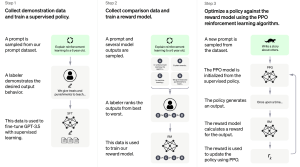
What’s more, as well as utilising some incredible learning capabilities, ChatGPT has been released to the market for free. Anyone can sign up and begin to onboard it into their business via their open API, which can integrate into their own software. In turn, this will help the system continue learning and developing, supporting it through its review stage and giving users a taste of what’s to come.
CEO Sam Altman has explained that they will need to monetize it at some point:
We will have to monetize it somehow at some point; the compute costs are eye-watering.
In the biggest tech sign-up we’ve ever seen, ChatGPT generated more than a million registrations in its first week; it’s clear the appetite in the market is there! We recommend signing up and testing the software’s capabilities out for yourself.
Open AI is not just limited to chat; it also brings AI software for voice and images.
In December, we saw the AI image trend take over Instagram as people’s feeds were filled with AI-generated selfies in a variety of styles. While the source of this trend is actually Lensa AI, this shows the widespread fascination with the creative capabilities of AI.
![]()
Throughout 2022, we saw numerous Google updates centred around creating a user-first experience. This means giving the user the information they want, when they want it, in the most effective way.
Some of the biggest updates included:
Since the dawn of search, Google has been working hard to create algorithms that deliver a positive experience for its users. So, on 6th January, when Bankrate took to Twitter with pride to openly share how it’s been using AI to generate content on life insurance policies, the buzz of chatter in the SEO community was significant.
The common question was, ‘what does Google really think of AI content?’
On 12th January, Barry Schwarts (Twitter’s @rustybrick) wrote an article that was published for Search Engine RoundTable that effectively compiles those conversations and reestablishes Google’s position.
Danny Sullivan pitched in on Twitter to say:
As said before when asked about AI, content created primarily for search engine rankings, however it is done, is against our guidance. If content is helpful & created for people first, that’s not an issue.
They’re referring back to the Helpful Content Update here. Their stance is that the most important thing is content created for users, not rankings. How this content is generated isn’t the issue. Danny then goes on to refer to Google’s spam policy; if the content is being written against this guideline – human or automated – the consequences of this are reiterated in Google’s Spam Policy. Danny also adds:
Our spam policies also address spammy automatically-generated content, where we will take action if content is generated through automated processes without regard for quality or user experience.
So, if you’re excitedly prepping 100 new blog posts on loads of new keywords to go live in the next week, we’d recommend not getting too carried away. Instead, perhaps, take a few minutes to make a cup of tea and consider what information your users really need.
AI In Action
Obviously, at Click Intelligence, our team had to investigate ChatGPT!
We logged in and began to play around with the capabilites…
You can feedback on how you find the tool and the quality of it’s information via their Discord server.
When you start the conversation, you get a screen with this information on it:
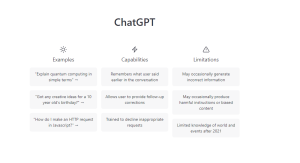
From here, you can get chatting!
We started the conversation by asking how Google views AI content:
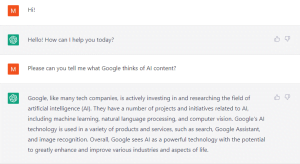
This first answer, while interesting, doesn’t quite hit the mark in discussing AI content.
We made our next question a bit more focused:

From here, we wanted to test it’s ability to generate ideas:

We refreshed and were back on track!
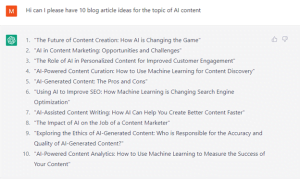
These ideas were generated in less than 2 minutes! These topics also cover a range of different covnersations that are being had on the topic of AI.
From here, we did have a go at confusing the system. We asked about Google’s Helpful Content update. Chat GPT has indexed information from Google, Wikipedia, YouTube and more but only up until the end of 2021. As the update occurred in 2022, we were curious how the tech would handle this…
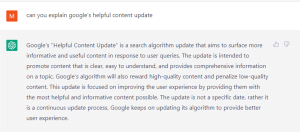
This is pretty impressive! We did want to push it a little further, to understand the limit of it’s information. We moved away from SEO to ask about Queen Elizabeth:

Here we can see Chat GPT admitting it’s limitations, and apologising for the lack of information it can provide on this topic!
So, now we’ve tried it out, what do we think?
ChatGPT could give you 50 blog article ideas in a few minutes. For supporting creative thinking, ChatGPT offers great starting points for ideas and conversations.
ChatGPT helps the development community when they’re writing code. Code can be incredibly complex, so this lends them a helping hand during those times. In addition, it can help aid research, understand how to implement new features, and help with rewriting code. For developers, ChatGPT is a huge time saver that gives incredible insight based on its continual learning.
Sometimes, writing content can take much longer than editing. AI-generated content can save marketing teams and writers significant time by helping get that first draft down. However, we must stress that here at Click Intelligence, authoritative content must have a human touch. So, if you use AI content for your website, ensure that you have human editors’ fact and sense checking.
What SEO out there doesn’t love another tool for keywordKeywords are the words and phrases that potential customers might search for to find your business. research? Being able to utilise AI to generate keywords speedily adds another data source for SEOs!
For the moment, at least, ChatGPT is completely free to use. Not only is this helpful for everyone (like us, who are desperate to test it out and understand what all the excitement is about), but this improves its learning, meaning that better content will be generated.
Due to the way ChatGPT is trained and learns, the program is constantly learning and developing. What we’re seeing now is powerful software still very much in the early stages. We can’t wait to see how this continual learning comes to fruition.
ChatGPT has learnt and, in its own way, indexed essential information from Google, Wikipedia, and YouTube. However, the information used runs to the end of 2021.
This means that fact-checking and human editing is essential. You need to ensure that the information being generated is up-to-date and current. Using poorly researched information that can mislead a user won’t fare well in the eyes of Google.
We cover this above, but in order to ensure the information is accurate and genuinely helps your users, it needs to be edited by a human.
Due to the huge sign-up rate, the software can hit capacity and be unusable. This isn’t ideal if you were planning on using this to hit a client deadline…

But this certainly indicates that it’s here to stay!
There have been reports of people utilising ChatGPT for malicious intent, such as hacking vulnerable sites. The creators have caught this and managed to filter it out, but the ethical conversations around AI and the considerations of how it can be utilised are still in their infancy.
Artists, photographers, writers, painters, content creators, poets, novelists… the creative community has a lot to say about ChatGPT and other systems like it. There are conversations regarding the work of creatives being taken and utilised to inform machine learning without consent or financial reimbursement for the creators. When dealing with Artificial Intelligence, the ethical and moral implications can be significant.
So, after trialling ChatGPT and considering the pros, cons, and Google’s views, what is our stance on it?
Whatever the topic, our first stance will always be to ensure you’re following Google’s guidelines. Always.
We recognise that AI-generated content can work well for certain niches, such as lifestyle or beauty, but we recommend approaching with caution regarding its use for any authoritative content.
Co-Founder James says:
AI is good for ideas that can help you along the way, for example, for blog posts. We always consider keywords; of course, we do. Still, the primary purpose of this content is to help users. AI can generate lots of ideas incredibly quickly, helping our efficiency in delivering quality content that delivers results if that content is written and edited by humans. AI can generate, in 2 or 3 minutes, ideas that may take hours to come up with. This is how to take advantage of this software, understand it, and still protect your SEO.
We then asked James if he thought our clients should write all their content using AI. Again, the answer was clear: No, absolutely not.
We think AI is fantastic for helping with the following:
However, human-written content comes up trumps for:
As mentioned above, our team does love that the software is currently free! AI will continue to become part of everyday life, and ChatGPT isn’t going anywhere. After all, it’s set to be the market leader with huge financial backing from Bill Gates and the system being utilised by Microsoft. We think, whatever your role, you should take a few minutes to sign up and try the software. Uncover for yourself its strengths and limitations. Google still wants content that is written ‘by the people, for the people’ (source: Google Reiterates Guidelines On AI Written Content After Bankrate AI Content Writer Gains Attention).
For now, we don’t think this is the end of human-written content, but we believe ChatGPT is a great tool that can help increase efficiency for lean teams by supporting them to generate ideas at scale.
If you’re still unclear on the role AI has in the SEO landscape, we’re more than happy to answer any queries you may have. Get in touch with our expert team.
We knew it was only a matter of time before Google responded to the launch of ChatGPT, especially considering its huge investment from Microsoft.
On Monday, February 6th, Google announced that it’s now testing ‘Bard.’
We get it; everyone’s just begun to wrap their head around ChatGPT.
So what exactly is Bard?
Bard is Google’s answer to ChatGPT. It is a conversational AI that is powered by LaMDA (Language Model for Dialogue Applications). LaMDA isn’t new; it was announced in 2021 to help create conversations through chatbots. Usually, chatbots have a set path and can be stumped if you ask something that goes against their markup. LaMDA was designed to enable natural conversation that covers multiple topics.
Bard is essentially like LaMDA light – it is an experimental conversational AI service requiring less computing power. This means that Bard will have better scalability and be able to help more users.
Google says that: Bard can be an outlet for creativity, and a launchpad for curiosity, helping you to explain new discoveries from NASA’s James Webb Space Telescope to a 9-year-old, or learn more about the best strikers in football right now and then get drills to build your skills.
Source: https://blog.google/technology/ai/bard-google-ai-search-updates/
With the race to be the market leader of artificial intelligence tools officially on, our question is, what does this mean for search?
Well, Google shared this screenshot showing how Bard’s AI will respond to long search queries:
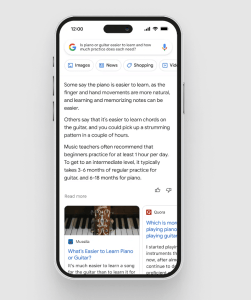
However, there is no need to panic that AI is fully taking over Google. It’s been made clear that Bard is a different entity from Google search. Rather, it’s an AI-powered feature that will be rolled out ‘soon.’ It seems that the aim is to further enhance the user experience by providing top-level insights that help guide their search journey.
Google’s CEO Sunar Pichai has said:
“Soon, you’ll see AI-powered features in Search that distill complex information and multiple perspectives into easy-to-digest formats, so you can quickly understand the big picture and learn more from the web: whether that’s seeking out additional perspectives, like blogs from people who play both piano and guitar, or going deeper on a related topic, like steps to get started as a beginner.”
AI isn’t going to replace search. Instead, it aims to enhance it. Motivated by more complex, unique searches, AI can provide insights for big questions where there isn’t a clear example.
Our team constantly stays up to date on the latest search engine news; we work with our clients to ensure they stay at the forefront of any changes.
The AI race is well and truly on. Just 24 hours after Google announced Bard, Microsoft announced its official new collaboration with ChatGPT.
Given the considerable investment Bill Gates has made into the software, this comes as no surprise.
So, how does this impact search? Search Engine Land Editor Nicole Farley got an opportunity to test drive the new Bing.
Nicole made it her mission to find the best coffee shop in her area, and the new Bing (enhanced by ChatGPT) provided conversational answers to help with the query.
It seems as though the purpose of AI in search isn’t to remove websites for further reading and research but rather to help guide people through their searches, making it easier for the user to get the information they want in a time-efficient manner without having to scroll through lots of information.
Rather, the AI-powered chat seems to be acting as almost a search customer service assistant. With over {NUMBER} sites on the web, AI’s role is helping to understand the user’s query to present the best results.
In terms of what this means for websites, it’s early days. Time will tell.
Bing is referencing site linksHyperlinks, also known as links, are the connection points on a webpage that take you to other webpages. in ChatGPT, but Google currently isn’t. For SEOs, this moves past the realms of zero-click results and drives us into zero-link results.
Naturally, the chatter in the SEO community over the last 24 hours has seen Google criticised for this. There is a general feeling that this is a direct attack on content publishers and that Google itself is now acting as a ‘scraper site.’ It’s taking information from websites, summarising it on a platter, and serving it up to users.
The lack of citationsA citation is a mention of your company, product, or service in an online publication. Citations increase the ranking of your site on search engines in Bard also raises questions and concerns around plagiarism.
With AI, plagiarism has been a hot topic. Artists and writers are experiencing their work being used without their consent, with no source or payment.
It’s complex because the AI isn’t plagiarising directly. Instead, it’s learning from source material and feeding this information back. It’s sort of like if a member of our team went to a conference, applied their learnings to a project, and then shared these learnings with the team. The knowledge came from someone else, but the learning has been their own. AI brings similar complexities.
Bard is currently going through a soft launch and a testing phase, allowing Google to take this feedback on board. Until then, we’ll keep following the story to understand how it will impact the SEO world.
The impact AI will have on SEO is a mystic art at the moment. We don’t know for sure, but we can use our experience to make predictions.
Our team think:
Google needs content to power AI, so we don’t believe this is the end of content, especially with the latest E-E-A-T results. However, to protect quality, Google must listen to feedback during the testing phase. The soft launch gives them room to take on feedback regarding Bard, but in an unlikely turn of events, it seems Bing is ahead of them, already offering citations when using AI search.
David Farmer, our Head of SEO, predicts that:
“It might make ‘authority building’ more important than ever – because if we ask ‘what’s the best Indian restaurant near me?’ it’s going to base the data from a mix of reviews, citations, existing listicles and backlink data, just as it does now but in a ‘conversation’ wrapper.'”
It could be worth considering having both informational and commercial pages for certain topics on your website to support the transactional terms, as informational search pages may see a drop in traffic. Given that 80% of searches are informational, the impact on organic trafficOrganic search traffic (sometimes called natural or unpaid search) is the traffic that's driven to a website because of unpaid placement on a search engine results page. could be significant.
On Wednesday, February 8th, Google updated their guidance on AI-generated content.
Google states that:
“At Google, we’ve long believed in the power of AI to transform the ability to deliver helpful information. In this post, we’ll share more about how AI-generated content fits into our long-standing approach to show helpful content to people on Search.”
Google reiterates the importance of E-E-A-T and helpful content. The quality of the content is the most crucial part, not if it was written by humans or AI. They recommend assessing content in relation to Who, How, and Why to keep content users focused, as well as sharing other top tips on creating helpful, people-first content.
Any content that has been generated to manipulate rankings is against Google’s guidelines.
As a team, we continue to question how users will interact with AI. Will they trust it? How will different demographics engage? We’ll keep questioning this hot topic and bring you our latest insight on this huge advancement in the world of SEO.
Contact us if you need support with your SEO campaign or technical SEO.
Download our free Millionaires SEO Guide Today!
Expertise. Authoritativeness. Trust. These are the three core pillars behind Google’s E-A-T concept. If you have been in the content…
It's clear that a new management approach can do wonders for your company, and one of the most cutting-edge and…
Comments (1)